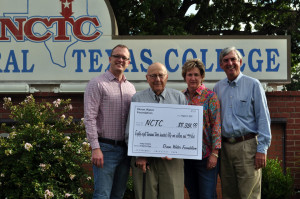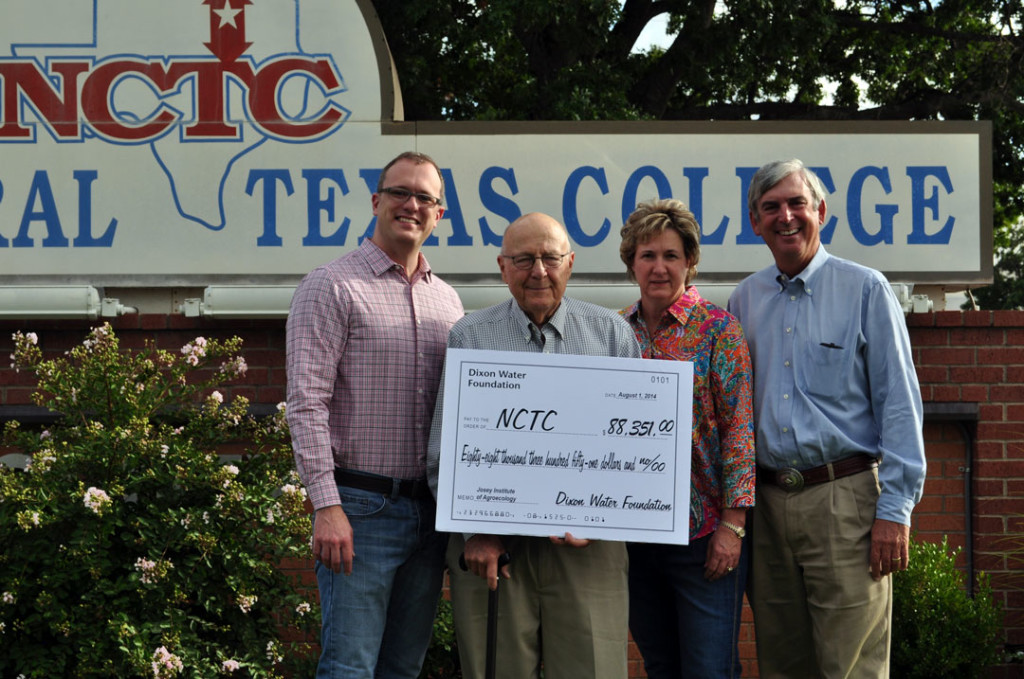“Understanding Soil Health and Watershed Function” is a new teacher’s workbook by Didi Pershouse, now available as a “sneak preview” for educators preparing their fall lessons. The Dixon Water Foundation supported the production of this resource, which was a joint project of the USDA Natural Resources Conservation Service, the USDA Southern Plains Climate Hub, The Soil Carbon Coalition, and Redlands Community College.
SRSU sustainable ranching students in Odessa news
Students in Sul Ross State University’s sustainable ranch management program were featured in an article in the Odessa American. Steve Lang writes:
Despite a steady rain, students learned basic welding techniques in assembling gates on the O2 Ranch.
“They got to use a bit of grit to get the job done,” said Bonnie Warnock, Clint Josey Endowed Chair for Sustainable Ranch Management.
Respect and Vision are other operative words for the new program, which will offer both a B.S. degree and certificate program in sustainable ranch management. Through a combination of classroom and hands-on ranch experience, students will learn how to manage a ranch, literally from the soil up. The curriculum includes classes in soils, range management, wildlife management, animal husbandry and agricultural business…
…Rob Kinucan, Dean of the College of Agricultural and Natural Resource Sciences, said the Sustainable Ranch Management program came to fruition through a pleasant combination of personnel and support.
“This has been an aspiration of Bonnie’s since she first joined the faculty, but we never had the mechanism to make it happen until the Dixon Water Foundation created the endowment,” he said.
“This is a wonderful opportunity and we have the perfect person to lead the program. Bonnie has the right combination of an academic background blended with applied life skills in ranching. This is a stellar program that really fills a niche in West Texas.”
Read the full article on the Odessa American website. And learn more about the sustainable ranching program on the Sul Ross website.
Kids on the Land at Bear Creek
Our education partner Kids on the Land was at Dixon Ranches Bear Creek Unit in September. Their outdoor environmental programs teach children about the region where they live, connecting them to the land and a more sustainable future. With support from the foundation, Kids on the Land partnered with Morningside Children’s Partnership to provide this program to third through fifth graders from the Edward J. Briscoe Elementary School, which is a neighborhood in Fort Worth that has suffered high unemployment, violence, substandard health care, and low educational outcomes for years. Check out the photo gallery below and the testimonials to see what an impact this program had.
September 17 is North Texas Giving Day, when matching donors will double any contributions made to this great organization. Visit the North Texas Giving Day website to learn more.
“Being a [volunteer] for KOL is the hardest work I have ever loved. Because of this experience many of these students will never look at their world in quite the same way. It is humbling, awesome and a joy to witness the impact one day in nature can have on a child.”—Karen McGinnis, Kids On the Land volunteer
“Teaching students in the Kids on the Land program connects them to their sense of place and the world they live in. It touches their souls and connects them to real world learning in a meaningful life changing way.” —Kathy Cash, Kids On the Land volunteer
“Best day of school ever!” —Charles, Briscoe 3rd grader
Grant for soil microbe research in the news
Hardin-Simmons University researchers recently received a Dixon Water Foundation grant to explore how land management affects the subterranean world of soil microbes on a Runnels County ranch. Learn more in this article from Ballinger News and the video below from Abilene Fox affiliate KXVA. KRBC meteorologist Scott Cook also featured the research project on Abilene’s NBC affiliate.
Grantee examines soil microbes
ABILENE—Under every farm and ranch around Abilene, a universe of microorganisms is toiling in the soil. Hardin-Simmons University researchers recently received a Dixon Water Foundation grant to explore how land management affects this subterranean world on a Runnels County ranch.
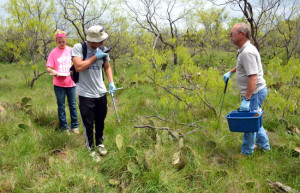
Hardin-Simmons University students Karissa Olson, Isaiah Longoria, and Michael Flud collecting soil samples from the wildlife pasture at Newman Ranch. Photo by Marla Potess
“Our food, our water resources, and many other ecosystem services start with soil,” said Marla Potess, an HSU environmental science professor leading the research. “Over the last 100 years, we’ve been really hard on our soils. Even with good, scientifically based management, soils are degrading, and many ecosystems are moving from highly productive to less productive. So I’m very interested in managing soils to improve microbial biodiversity, which may impact water retention and plant biodiversity and productivity.”
In what they hope will become a long-term study, Potess and HSU biology professor Jennifer Hennigan are examining soil microorganisms on the Newman Ranch in Runnels County, about 40 miles south of Abilene. HSU professor emeritus and trustee George Newman invited the university to use his ranches as outdoor laboratories and created an endowment to fund research on his family property.
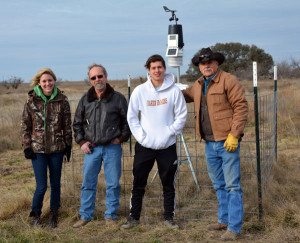
HSU environmental science students with professor emeritus Dr. George Newman by the weather station at Newman Ranch. Photo by Marla Potess
“For the past 40 years, as time and finances have allowed, I have been converting my cropland back into native grassland,” Newman said. “I feel that my philosophy of land stewardship closely mirrors that of the Dixon Water Foundation and I am very appreciative of their support for this program.”
The Newman Ranch study sites have the same soil type but have been managed very differently, Potess explained. For example, one site is a cultivated hay grazer field, while another is being restored to native prairie grasses. Potess and Hennigan are looking for differences in the soil microbial communities at each site, which they eventually hope to correlate with different management techniques used in each pasture.
HSU students have been actively involved in the research, collecting and analyzing soil samples and drafting research proposals related to the project. The Dixon Water Foundation grant will fund DNA sequencing that will provide a snapshot of the microbial diversity at each study site.
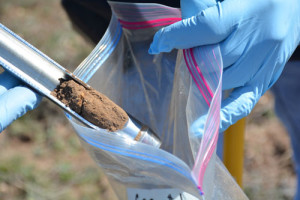
The Dixon Water Foundation grant will be used to analyze DNA from soil core samples collected earlier this year. Photo by Marla Potess
“It’s exciting for students to participate in a project that’s asking really important questions and filling in real information gaps,” says Potess. “The preliminary data this spring indicates we’re on the right track, so we’re really excited to see what we find this summer when the DNA is extracted and processed.”
Ultimately this research could help farmers and ranchers better understand how their actions aboveground affect the microscopic world underground.
“The hypothesis is if soils have diverse, healthy microorganisms, they can hold more water,” Potess said. “And that has important implications for drought resistance for crops and restoring grasslands.”
Those implications helped attract support from the Dixon Water Foundation, which promotes healthy watersheds through sustainable land management. The foundation funds research and education projects tied to this mission and demonstrates sustainable grazing management on its four ranches in North and West Texas.
“We hope this research will help farmers and ranchers improve the economic productivity of their land by building healthier soils and healthier watersheds,” said Robert Potts, the foundation’s president and CEO.
North Texas Land Scholars application deadline July 1
North Texas Land Scholars is a five-day leadership camp that fosters a passion for land stewardship through hands-on activities like hunter safety, plant and insect collections, quail habitat analysis and dissections, and much more. A partner of the Dixon Water Foundation, UNT Quail created this program to encourage youth to become responsible leaders and land stewards, and ultimately to restore the ranch and wildlife legacy of Texas. The application deadline is July 1, and the 2015 camp runs July 26-31 at Camp Grady Spruce. Financial assistance is available, and scholarships are awarded during the camp. For more information and an application, visit the North Texas Land Scholars website.
Livestock management for coexistence with carnivores
“Ranchers can apply many of the same management approaches that work for land health and livestock production to prevent conflicts with large carnivores,” states Matt Barnes, field director for Keystone Conservation, in a new white paper that was funded in part by the Dixon Water Foundation.
“Modeling livestock management after the grazing patterns and reproductive cycles of wild ungulates in the presence of their predators can improve rangeland health and livestock production—and increase the ability of ranching operations to coexist with native carnivores,” continues Barnes in the paper’s abstract. “The central anti-predator behavior of wild grazing animals is to form large, dense herds that then move around the landscape to seek fresh forage, avoid fouled areas, and escape predators. They also have their young in short, synchronized birthing seasons (predator satiation). Grazing management involving high stocking density and frequent movement, such as rotational grazing and herding with lowstress livestock handling, can improve rangeland health and livestock production, by managing the distribution of grazing across time, space, and plant species. Short calving seasons can increase livestock production and reduce labor inputs, especially when timed to coincide with peak availability of forage quality. Such livestock management approaches based on antipredator behaviors of wild ungulates may directly and synergistically reduce predation risk— while simultaneously establishing a management context in which other predation-prevention practices and tools can be used more effectively.”
The full white paper, “Livestock Management for Coexistence with Large Carnivores, Healthy Land and Productive Ranches,” is available as a PDF on Keystone Conservation’s website: http://www.keystoneconservation.us/PDFs/KeystoneConservation_2015_WhitePaper.pdf
Keystone Conservation has developed several other resources for range managers about how grazing management can prevent conflict with large carnivores, while improving land health. The organization recently consolidated with People and Carnivores.
Hickory Creek Watershed workshop in Denton May 21
A Texas Riparian and Stream Ecosystem Workshop in the Hickory Creek Watershed will be held on May 21 in Denton. The training will focus on the nature and function of stream and riparian zones and the benefits and direct impacts from healthy riparian zones. This workshop is supported in part by a grant from the Dixon Water Foundation and is being co-hosted by the City of Denton and the Upper Trinity Conservation Trust. Learn more about this program and similar riparian workshops on the Texas Riparian Association’s website. RSVP required by May 15.
Josey Agroecology Institute in Lewisville Leader
On August 12, the Lewisville Leader featured the Josey Agroecology Institute at North Central Texas College, funded by a grant from the foundation.
Clint Josey (second from left), the Chairman of the Board of Directors of the Dixon Water Foundation, presents a check to NCTC officials to establish the Josey Institute of Agroecology. Also pictured is NCTC President Dr. Brent Wallace (left), NCTC Science and Math Initiatives Chair Dr. Lisa Bellows, and Dixon Water Foundation CEO Robert Potts.
Dixon funds agroecology institute at NCTC
GAINESVILLE―A new institute at North Central Texas College will promote sustainable agriculture and healthy food production.
The Josey Institute for Agroecology will conduct research and offer educational programs on sustainable ranching and farming for NCTC students, as well as land owners and the general public. The institute’s creation was funded through an $88,000 grant from the Dixon Water Foundation, which promotes healthy watersheds through sustainable land management and has two ranches in Cooke County.
“This institute will help train a new generation of land stewards to manage economically and ecologically sustainable ranches, which are so important to our state’s future,” said Robert J. Potts, president and CEO of the Dixon Water Foundation.
Receiving the foundation’s check on his first day as NCTC president, Dr. Brent Wallace said, “Service to the community is a vital part of our mission. The establishment of the Josey Institute at NCTC is going to allow us to explore some innovative approaches in serving our students, as well as the entire community, by including programs for planetary sustainability. We are extremely grateful for the monetary contribution, but even more honored to have the opportunity to work in partnership with the people at Dixon Water Foundation.”
Science professor Lisa Bellows will direct the institute. “This will be an exploratory year for the Josey Institute, so that we can define the needs of our community, organize our approach, and target the position of NCTC as a leader in agricultural ecology,” Bellows said.
The institute will serve as the new home of the Promoting Agriculture and Conservation Education (PACE) Project, an existing collaboration between the college and the Gainesville Independent School District. PACE students learn about sustainable ranching on a holistically managed property south of the Gainesville High School. Rotational and multi-species grazing are demonstrated on the property, which is owned by the school district and leased by the college. The Dixon Water Foundation has previously funded the PACE Project as well.
The PACE Project has offered several programs for agriculturalists in the past three years. Bellows said, “Internationally recognized soil microbiologist Dr. Elaine Ingham attracted over 180 visitors to our campus, and we provided soil micro training for over 100 participants this past year.”
Through the institute, Bellows will be teaching a Sustainable Agriculture course this fall, in which Whole Land Management will be the focus. The institute has also scheduled several programs for the general public in the coming year.
The Dixon Water Foundation’s mission is promoting healthy watersheds through sustainable land management. To that end, the foundation demonstrates sustainable land management practices at its four ranches in north and west Texas. In Cooke County, the foundation’s Leo ranch is the site of the new Betty and Clint Josey Pavilion, which aims to be Texas’ first Living Building, the highest standard in sustainable building. The foundation also hosts educational programs, partners with researchers, and funds grants for projects that further its mission.

